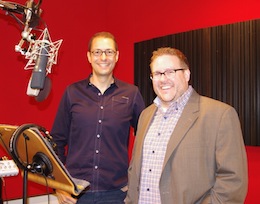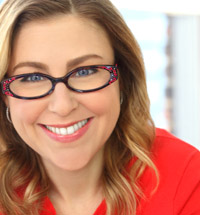Let’s Shut Up and Talk Demo Reels
Speak Easy caught up with Julian Rebolledo, Sean Kenin, and Ed Lewis, the team behind Shut Up and Talk. Voice actors Rebolledo and Kenin launched Shut Up and Talk in 2001 and for the next seven to eight years, the two coached, produced demos, and taught some voice over classes. In 2008, Julian wanted to expand the company, so they rebranded and started an audio post production company called Hyperbolic Audio. Today Hyperbolic provides the full audio post services while Shut Up and Talk continues as the educational arm.
Ed Lewis produces Shut Up and Talk demos with Hyperbolic engineers in their studios. And Ed is super credible to produce demos: He’s a casting director (“The Wonder Pets,” “Team Umizoomi,” and numerous voiceover campaigns), directs audio books, and also spent three years as a voiceover agent.
Jen: What’s the number one misconception about demo reels?
Ed: A big misconception about demos is that you need to show your entire range and I don’t believe that’s true. The audience for your demo is agents. You want to show them: “Look, I can make you some money!” So at Shut Up and Talk, we aim to produce five spots. Our intention is to make it sound like five different spots recorded in five different locations and assembled into your demo.
Jen: How does an actor know if they are ready to make a demo?
Julian: Your read needs to be compelling and competitive. Everybody wants a demo, but we need to hear you first. People think we just want their money, but we really have to assess them and then decide if they are ready to make a demo.
Sean: When Julian and I started we turned away a lot of people who wanted to make demos, and we ate a lot of cheap food, and the two of us had a lot of down time! But looking back we are really glad we made the choices we did early on.
Ed: You cannot and should not make a demo until you are ready.
Jen: What makes somebody ready? And if they are ready, what’s the process?
Ed: I coach privately with each actor to assess their skills. When their first and second reads are competitive with what I am hearing during my days in my own casting sessions, that’s when I feel they are ready.
Jen: How has your background as a voiceover agent prepared you for your job now?
Ed: Everything I know about how to produce a demo came from my years as an agent because I heard so many bad demos. So much of my job was listening to demos. I got demos with people doing multiple animated voices and accents.
 Jen: Don’t actors think they can do all kinds of voices?
Jen: Don’t actors think they can do all kinds of voices?
Ed: They may be able to, but agents don’t want variety. We like versatile actors for film, TV, and theater, but in the commercial world, variety is not always what we are looking for. Bottom line: I really need to know if you can deliver a piece of Sprint copy in a conversational manner and make it your own as well, not that you can do every single accent and voice on the planet.
Jen: So actors need to be really clear with what their strengths are.
Ed: Absolutely!
Jen: So what’s the word on the various kinds of demos: animation, commercial, narration, regular VO demo? Are they all on one? Are they three separate demos?
Julian: Separate demos. You can decide which demo you want to make with us.
Ed: You can’t mix sounds on your demo, or genres. You don’t need to show off your whole range. I believe in NYC the only demo you should be working on is a commercial demo.
Jen: Okay, so I’m ready to make my commercial demo. Take me through the process.
Ed: We meet for a first coaching here at Hyperbolic Audio. The first time I work with somebody I lay out a lot about the commercial business. We work in the studio. I throw a bunch of scripts at them. I’m not the Wizard of Oz. I can’t predict if you’re going to make it, but I do share some feedback about what I hear and assess how many coaching sessions I think you’ll need in order to be ready to make your demo. Then it’s the actor’s choice whether they want to invest that kind of time and money into it. I’m not in this demo and production coaching business just to make money. I don’t just want to churn out demo after demo. I’d want to make demos for people who are ready, and high quality demos, which is something Shut Up and Talk has been doing since its launch. I want to be 100 percent behind every demo.
Jen: So it’s quality not quantity. How long is the process?
Ed: You’re in the booth for a little over an hour. Once the spots are recorded, the engineer and I will choose music.
Julian: That’s where Hyperbolic comes in. We have relationships with music houses and music libraries. And we work out a reasonable rate so we can pass it on to the actors.
Jen: So when you finish your demo here, what do you get? A CD, an MP3?
Ed: We deliver an MP3 and a wav file. I do have a consultation once we are done with the demo to teach them about what to do with the demo, and about the websites that they can make some money on. I’ll help them set up their home studio. I also tell them who the nonunion agents are as well as the union ones. I compose the letter.
So all in all, it’s a great deal over at Shut Up and Talk. And as I stress over and over in my book “Confessions of a Casting Director,” you only have one chance to make a good first impression. Don’t make a demo on your iPhone! Just like you go to the dentist, or your accountant, seek out the professionals for your demo!
Jen Rudin is an award-winning casting director and author of “Confessions of a Casting Director: Help Actors Land Any Role with Secrets from Inside the Audition Room.” (Harper Collins/It Books, 2013). Visit www.jenrudin.com and follow @RudinJen.




